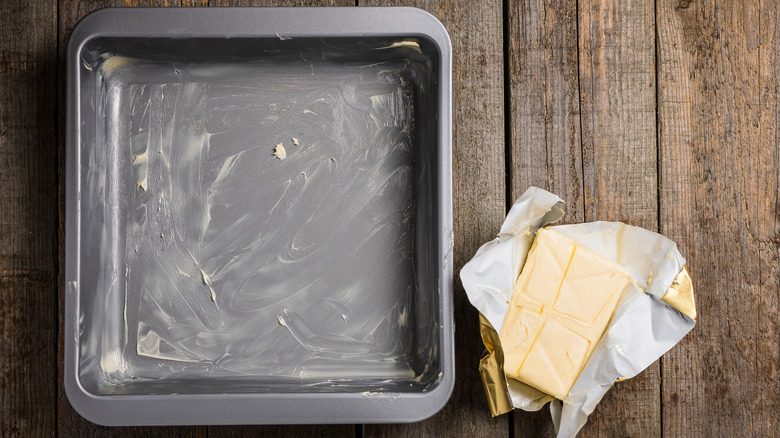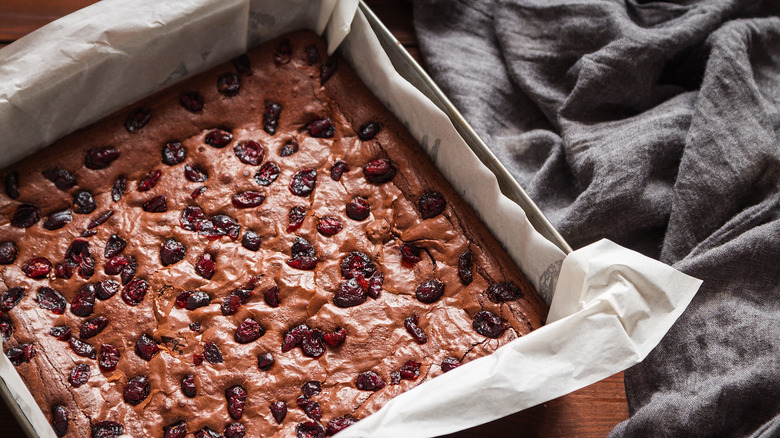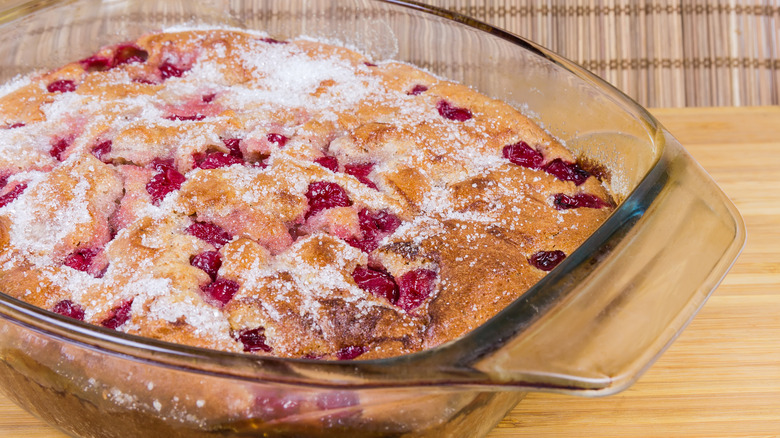Glass Vs Metal Baking Pans: What Is The Difference?
Glass versus metal pans is but one great debate in the baking world, where details are of prime importance. People say baking is more of a science than stovetop cooking: Why? Because exactness matters. The amount of humidity in the air and the altitude of your city can affect how your dish turns out. Yeast and other components create chemical reactions that make the dough rise. There's gluten formation, starch gelatinization, and protein coagulation. And there is just so much more.
One thing many beginner bakers forget to think about is how their baking pan — glass or metal — is going to react with the ingredients. The best bakers are meticulous testers and re-testers. They form a hypothesis, conduct the experiment, and based on the result, come to a conclusion. That conclusion could be that brown sugar rather than white sugar makes your cookies softer and more moist, for instance. Or it could be that one kind of pan results in crispier cookie bottoms or chewier brownie edges. Pan material also matters when it comes to making savory dishes, as you'll see below.
Metal pans
Metal bakeware can withstand higher temperatures than glass, which makes it ideal for foods that bake for a short period of time at a higher temperature, including baked goods such as cookies, biscuits, cakes, muffins, and breads. Metal baking pans are also preferred when browning foods and quick roasting since they tend to heat up quickly and cool down relatively fast (so actual sheet pan dinners are generally better than Pyrex glass dish dinners).
You want to use a metal dish when broiling at high oven temperature too, as that can cause glass to shatter. Glass also can shatter if used directly on the stovetop, so if you're planning to start something on the stove before transferring to the oven, consider using a metal pot that is safe for both stovetops and ovens. (This advice usually applies primarily to savory dishes, but sometimes desserts too). When baking, it does make a difference too whether you use dark or light-colored metal pans; darker metal tends to make browning happen faster, so you may prefer lighter pans for cookies, banana bread, cakes, and the like.
Glass pans
Glass bakeware has the advantage that it distributes heat more evenly, which will cause your food to likely cook at an even rate. However, glass is a poor conductor of heat — meaning it doesn't heat up quickly, but once it has warmed up, it will stay warm long after it's removed from the oven. (For an example of how that can affect baking in real life, consider a glass pie plate. Because it distributes heat consistently, it will promote even baking of your crust — and as an added bonus, allow you to see the progress instead of guessing if the bottom is brown yet — but because it doesn't heat up quickly, glass pie pans can cause crusts to shrink and slide toward the bottom more so than metal or ceramic pie pans).
Use glass dishes when baking with eggs or acidic ingredients (think tomatoes and citrus), as metal pans can react with the acidity and cause foods to discolor or leave a metallic taste. Another disadvantage to glass bakeware is that it isn't able to jump quickly with temperature changes and can even break when experiencing extreme temperature shifts. This isn't common but it's recommended that you never put your glass bakeware directly on the stove burner or under a warmed-up broiler, just in case.
Something to keep in mind is that you should reduce baking temperature by 25 degrees and check the food often as it may be ready up to 10 minutes earlier if you are substituting a glass dish for a metal baking pan. This is because glass doesn't heat up as quickly as metal but will become very hot once heated up.


